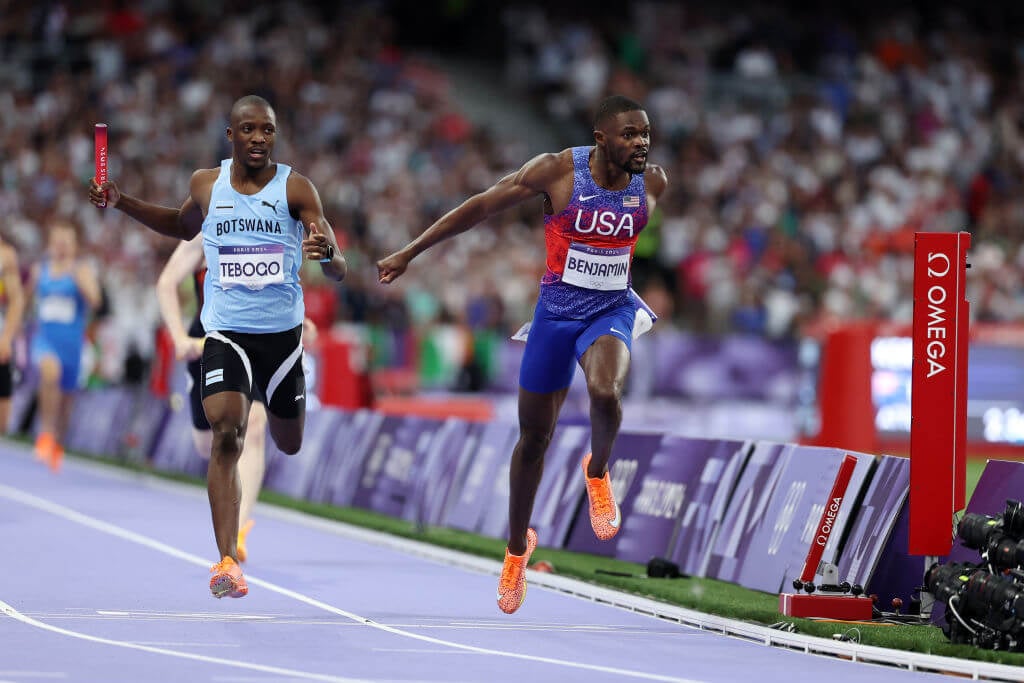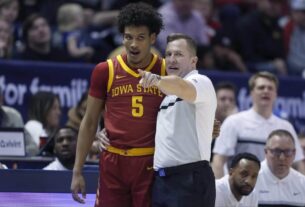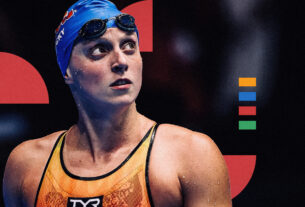SAINT-DENIS, France — Everything that makes Rai Benjamin such an effective anchor leg was on display. Required by the task.
Officially, he had a quarter-of-a-second lead when he got the baton from Bryce Deadmon. It took a monster 43.54-second run from Deadmon to drag the U.S. from third place to a small lead. The anchor just had to do what he does. Close.
Here is the major problem Benjamin had this time: Letsile Tebogo of Botswana. The same sprinter who ran the men’s 200-meter final in 19.4 seconds to win gold.
“I run the 400 hurdles,” Benjamin said, “so I’d like to think that my engine is bigger than his. But nineteen-four? We cannot sleep on that.
“And just the sheer talent that he has. … That’s generational right there. The kid’s freaking great.”
So it was time for Benjamin’s experience to kick in. For his strategy. For his speed. For his patience and poise.
For his loyalty.
“Somebody cracked a joke in there … that had to do with Noah (Lyles),” Benjamin said. “Oh they cracking jokes? … You guys about to get punished right now.”
Rai Benjamin holds off Letsile Tebogo to anchor Team USA to gold in the 4x400m relay! #ParisOlympics
NBC & Peacock pic.twitter.com/MhJbrRH43D
— NBC Olympics & Paralympics (@NBCOlympics) August 10, 2024
The men’s 4×400 relay has been contested now in 26 Olympiads. America has won 19 of them, including nine of the last 11.
This comes one night after the 4×100 relay team — featuring some of the fastest men in the world — squandered their chance at gold. After getting disqualified for the first exchange happening out of the zone, American sprint legend Carl Lewis demanded an overhaul of that relay program, which hasn’t won a medal since 2004 or a gold since 2000.
“They know my number if they want me,” said sprint legend Maurice Greene, part of the last gold medal 4×100 relay team. “It’s just terrible. There’s no reason why we shouldn’t have won.”
But those problems don’t extend to the other relay. (Of course, the hand-offs are far less intense when you have an entire lap to run.)
The 400-meter runners aren’t the most glorified of America’s sprinters. They’re gold medalists and record holders in their own right. But their names aren’t on the marquee of USA Track and Field. Yet they’ve consistently gotten the job done.
The Paris Games proved to be no different. But it wasn’t easy.
The gamesmanship began early. In the call room before the runners took the track, Benjamin said Botswana organized as if Tebogo wasn’t running anchor. The ploy didn’t work, though. They all knew Tebogo would finish.
“And I knew it was gonna be a fight coming home,” Benjamin said, “so it was probably my most calculated anchor leg that I’ve run since I’ve been anchoring this relay for the past couple (of) years.”
Benjamin clarified the joke about Lyles was harmless and it wasn’t Botswana. He wouldn’t say anything more than it wasn’t anything offensive or derogatory. Just part of the mind games that go on behind the scenes, and that he didn’t like it. Because in the throes of competition, any banter is a salvo. It’s all motivation.

GO DEEPER
Rai Benjamin claims his first Olympic gold in men’s 400m hurdles
It takes more than mind games to beat Benjamin, who couldn’t remember the last time he lost a relay in which he anchored.
“Maybe in high school,” he said. “Maybe.”
He now has two Olympic championships as the anchor, including the last Olympics in Tokyo. He also has two gold medals from the World Championships as anchor. And two NCAA championships, outdoor and indoor, as anchor.
Is he America’s greatest closer ever?
“Michael Norman,” Benjamin said after a pregnant pause. “Yes. You’ve seen Michael Norman flat-out run forty-three-oh in Sacramento. Straight gas. Look it up.”
Indeed, Norman ran a 43.06 for USC in the NCAA West preliminary round at Sacramento State in 2018. Benjamin ran the first leg in that race.
“When Michael’s healthy and he’s firing on all cylinders,” Benjamin said. “A dangerous guy.”
On this night, the dangerous guy was Tebogo, and all the U.S. had was Benjamin. He played a perfect game of chess, knowing the 400 meters is uncomfortably long for the elite sprinter from Botswana. Benjamin went fast enough so Tebogo had to work hard and drain some energy. But Benjamin couldn’t go too fast so as not to burn himself out. He was going to need his closing speed.
For 200 meters, with Tebogo’s breath on his neck, Benjamin worked his strategy. He stayed patient, focused on himself and his race. He didn’t look up at the jumbotron to monitor Tebogo. Benjamin let his feel and instincts guide him. Then, at the right time, “just kick like hell coming home.”
Tebogo’s speed was countered. Benjamin’s lead was preserved. And the gold medal was America’s.
“Because,” Vernon Norwood said of Benjamin, “he’s Captain America.”
Required reading
(Photo: Hannah Peters / Getty Images)





